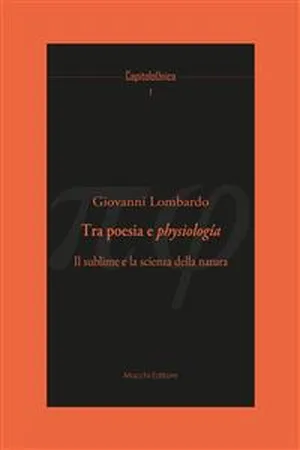
- English
- ePUB (mobile friendly)
- Available on iOS & Android
About this book
Uno schema storiografico piuttosto frequente tende a distinguere il sublime degli antichi, che ha un accento prevalentemente retorico inteso a definire una certa istanza di grandezza per entro al discorso letterario, dal sublime dei moderni, che ha invece un accento prevalentemente filosofico, volto a definire un certo tipo di rapporto tra l'uomo e la natura. Gli studi più recenti hanno però dimostrato che, nella cultura greca e latina, l'idea di un sublime naturale non era ignorata e si esprimeva soprattutto attraverso una sensibilità cosmologica cui dava voce la poesia ispirata dalla physiologia, cioè dalla scienza della natura. Lungi dal riuscire occasionale, l'interesse degli antichi per il sublime della natura non era meno importante dell'interesse per il sublime dello stile. GIOVANNI LOMBARDO, insegna Estetica presso il Dipartimento di Scienze Cognitive, della Formazione e degli Studi Culturali dell'Università di Messina. Tra le sue pubblicazioni: Hypsegoria. Studi sulla retorica del sublime (Mucchi, 1988), L'estetica antica (il Mulino, 2002), La pietra di Eraclea. Tre saggi sulla poetica antica (Quodlibet, 2006), La traduzione della poesia. Studi e prove (Editori Riuniti, 2009), L'esthétique antique en 50 questions (Klincksieck, 2011). Ha inoltre tradotto e commentato: Ps. Longino, Il Sublime (Aesthetica, 2007, terza ed.), Demetrio, Lo Stile (Aesthetica, 1999) e ha curato l'ed. ital. di W.J. Verdenius, I principi della critica letteraria greca (Mucchi, 2003).
Cura per Mucchi la collana CapitoloUnico.
Frequently asked questions
- Essential is ideal for learners and professionals who enjoy exploring a wide range of subjects. Access the Essential Library with 800,000+ trusted titles and best-sellers across business, personal growth, and the humanities. Includes unlimited reading time and Standard Read Aloud voice.
- Complete: Perfect for advanced learners and researchers needing full, unrestricted access. Unlock 1.4M+ books across hundreds of subjects, including academic and specialized titles. The Complete Plan also includes advanced features like Premium Read Aloud and Research Assistant.
Please note we cannot support devices running on iOS 13 and Android 7 or earlier. Learn more about using the app.
Information
Table of contents
- Copertina
- Colophon
- Sommario
- Avvertenza
- Un giudizio di Galilei su Dante
- Sublime degli antichi e sublime dei moderni
- Poesia e physiología
- Il sublime fra terra e cielo
- La critica “sferopoietica”
- Grandezza dell’ingegno e grandezza del cosmo
- Extra moenia mundi
- La períodos e lo stile sublime
- Ordine cosmico e ordine frastico
- Oltre il “celeste confine”
- Note
- Bibliografia